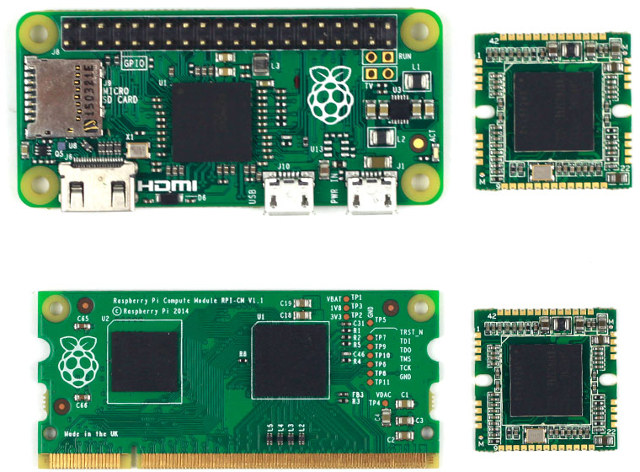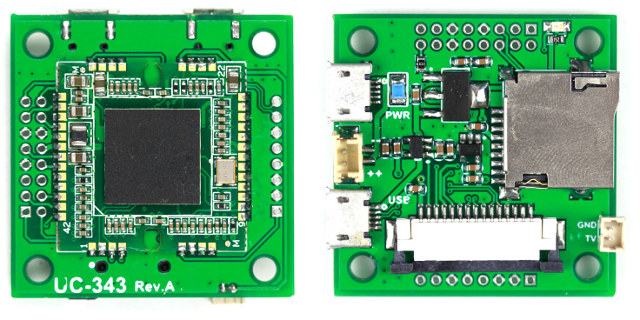Now you can design your own custom hardware and leverage Raspberry Pi software, by integrating Raspberry Pi Compute module (and soon Raspberry Pi 3 Compute module) into your custom designed baseboard. But if you’d like something more compact, and even more compact than a Raspberry Pi Zero or RPi Compute module, ArduCAM has been developing a 24x24mm Raspberry Pi compatible system-on-module powered by Broadcom BCM2835 processor.

ArduCAM has also designed a small adapter board “UC-343 Rev. A” for the module with the following specifications:
- SoC – Broadcom BCM2835 ARM11 Processor @ 700 MHz (or 1GHz?) with Videocore IV GPU
- System Memory – 256MB/512MB LPDDR2
- Storage – micro SD card slot
- USB – 2x micro USB ports including one for power only
- Camera – 1x MIPI CSI connector supporting 5MP or 8MP Pi cameras (dual camera support)
- Expansion –
- AV output header
- 16-pin and 8-pin headers (unpopulated) with GPIOs, 2x I2C, UART, 2x SPI
- Misc – Power LED
- Power – 5V via micro USB port, or battery header
- Dimensions – 36x36mm (Module only: 24mm x 24mm)
- Weight – 5 grams

Since it’s compatible, it should run any operating system or program supported by Raspberry Pi Model B, Zero, and Compute module. They have even posted a demo video last month using the module connected to UC-343 demo baseboard.
I’ve not been able to find availability nor pricing information, but since it’s starting to show up on some shops without price, it should be available very soon. ArduCAM website only seem to have the announcement, but no further details. If the module gets a little too popular, it could also end up being killed, just as what happened to ODROID-W board, as Broadcom may refuse to sell the processor.
Via Amornthep on Facebook.

Jean-Luc started CNX Software in 2010 as a part-time endeavor, before quitting his job as a software engineering manager, and starting to write daily news, and reviews full time later in 2011.
Support CNX Software! Donate via cryptocurrencies, become a Patron on Patreon, or purchase goods on Amazon or Aliexpress. We also use affiliate links in articles to earn commissions if you make a purchase after clicking on those links.





Maybe they can avoid ending up like Hardkernel with their ODROID-W by selling both UC-343 and the module only as ‘add-on’ for their various camera modules (still my only use case for any RPi — being able to get HW accelerated H.264 video encoding from a CSI module — since all the stuff happens on the VideoCore BCM2835 can be downclocked to even 200MHz and video encoding still works flawlessly)
Maybe you should clarify ‘2x micro USB ports’ since it’s only one USB port and the other is only used to provide power.
Would be very good if it becomes real.
Why broadcom refuse to sell more soc?
@Fan
We will never know 😉 http://forum.odroid.com/viewtopic.php?f=103&t=6359
@tkaiser
That was very unethical from Broadcom. Some companies refuse to work with smaller companies, but they tell it to you at the very beginning, they don’t let the company goes through the development cycle, order 5K, and then sorry, bye!
ArduCAM appears to be based on China, so maybe they have more flexibility to source the processor, and they may have the right connections.
Broadcom BCM2835 can be purchased on 1688.com @ https://s.1688.com/selloffer/offer_search.htm?keywords=bcm2835ippg&button_click=top&earseDirect=false&n=y with resellers having a few hundred samples, to several thousands.
So maybe it will be difficult to stop them…
@tkaiser
i agree the h264 encoder on the rpi is a great tool, i was so disapointed when they introduced the zero without csi connector but they realized their mistake and added it afterwards..
It must be said that for HD encodings, the quality remains decent only at very high bitrates > 10Mbps but maybe that’s a general fault of realtime encoders.
the rpi is also great to do audio streaming projects (steaming clients, multiroom systems..), especially high end ones with a decent dac addon board.
@cnxsoft
As for Broadcom soc suppliers, i don’t know if it’s their fault but the production of rpi zero seem to be a real nightmare and it’s been months for the rpi foundation to find a way cope with the demand, websites selling only one piece per customer..
Is it the same soc as the one used by arducam and odroid-w, i thought broadcom designed that soc for rpi, maybe the new multicore ones then, not the original single core BCM2835 ?
@mdel
If I remember correctly Broadcom BCM2835 is used in older Roku products, and for the first board, Broadcom was not going to make a RPi only board, since they only planned to sell about 10k over the course of the project.
But since it became so successful, Broadcom designed BCM2836 and BCM2837 specifically for Raspberry Pi boards, and it’s probably impossible to buy those for anything else.
I’m also not sure whether all BCM2835 processors sold on the market come with PoP memory, which would be an issue.
Anyway, I’ve now learned that ArduCAM cannot be considered seriously for commercial projects in the west, because of RPI bootloader license: http://www.cnx-software.com/2016/07/19/raspberry-pi-bootloader-license-preludes-it-to-run-on-competing-broadcom-bcm283x-boards/
@mdel
While BCM2835 was used also at least in the Roku 2 XS, the 2 successors replacing the single ARM1176 CPU core with quad-cores seem to be RPi only: https://en.wikipedia.org/wiki/VideoCore#Table_of_SoCs_adopting_VideoCore_SIP_blocks (didn’t know that VideoCore SoCs even without ARM cores existed back then — but that pretty much explains the non-standard booting procedure on any RPi and the limitations like FAT boot partition, maximum 1GB DDR2 DRAM and so on)
Regarding bit rates: we usually record video at just 960×540 pixels with the following settings:
Streams will then be collected on a GbE equipped A20 board with SATA and each raw h.264 stream gets transcoded live using VLC to be watched from smartphones/tablets also using VLC there as well as written to disk and put in an MP4 container every hour using MP4Box:
Since the bootloader license prevents running the whole stuff on RPi compatible boards like ArduCam’s it’s time to get HW encoding running on other SoCs. A cheap H3 board for $12 combined with GbE Ethernet for $7.50 and a GC2035 or OV5460 camera module together with this HW encoder PoC might be a first step in the right direction: https://github.com/rosimildo/videoenc
@tkaiser
i’m using picamera python lib myself, and i failed to mention that high bitrates become quite troublesome with local sdcard storage so that’s a limitation of such an embedded encoder. One thing i really didn’t solve on the rpi was to find a way to record audio, but i digress.
thx for the links, the usb3 gbe adapter is a good idea to get better than 100Mbps speeds (at a cost), i’ll try that too.
I ordered a camera module with my opi pc, so i guess i’ll have to test that as well.
i’m hoping for the same on amlogic socs but haven’t had time to browse for that so i don’t know the state of things.